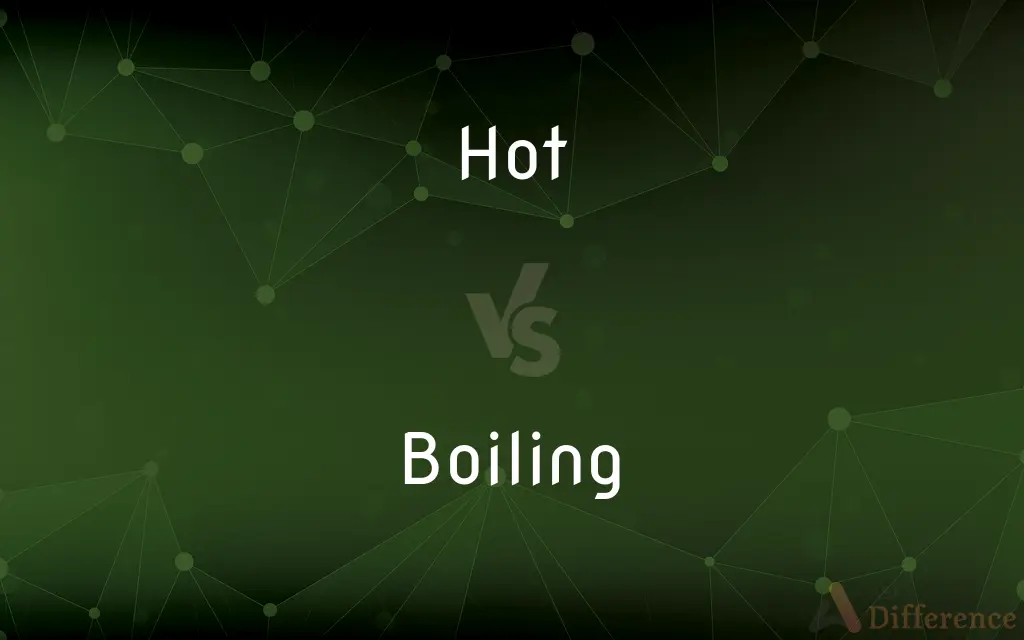Hot vs. Boiling — What's the Difference?
By Maham Liaqat & Fiza Rafique — Updated on March 27, 2024
Hot refers to a high but unspecified temperature, comfortable or uncomfortable to touch, while boiling specifically means reaching water's boiling point (212°F or 100°C), where it turns to vapor.

Difference Between Hot and Boiling
Table of Contents
ADVERTISEMENT
Key Differences
Hot is a term used to describe an object or substance with a high temperature, which can vary widely depending on context. For example, a hot beverage might be around 160°F (71°C), comfortable enough to drink with caution. On the other hand, boiling specifically refers to the temperature at which a liquid turns into vapor, which is 212°F (100°C) for water at sea level. This distinction is crucial in culinary, scientific, and everyday contexts to avoid confusion and ensure safety.
While "hot" can apply to various degrees of warmth, from slightly above body temperature to just below the boiling point, boiling is an exact state of temperature. This state is important for processes like sterilization, cooking, and certain chemical reactions, where achieving or avoiding the boiling point is critical. In contrast, describing something as hot might not provide enough information for precise activities, emphasizing the importance of context.
In terms of perception, hotness can be subjective; what feels hot to one person might be tolerable to another. This subjectivity does not apply to boiling, as it is a specific, measurable phase change of a liquid into gas, observed universally. This makes boiling a more objective and quantifiable term compared to the relative and subjective term hot.
When it comes to handling or consuming hot and boiling substances, safety precautions differ significantly. Hot items might require basic caution, but boiling substances pose a greater risk of causing burns or injuries, necessitating more stringent safety measures. This distinction highlights the importance of recognizing and respecting the varying degrees of temperature hazards.
Finally, in culinary contexts, the difference between hot and boiling can affect food preparation and cooking outcomes. Foods or liquids that are heated to just hot might retain more of their nutrients and flavors, whereas boiling can lead to loss of nutrients and changes in texture. This demonstrates how temperature management is key to achieving desired culinary results.
ADVERTISEMENT
Comparison Chart
Definition
Describes a high temperature, not specific or uniform.
Refers to the specific temperature at which a liquid vaporizes.
Temperature Range
Wide range, from slightly above room temperature to just below boiling.
Fixed point, 212°F (100°C) at sea level for water.
Subjectivity
Can be subjective based on individual perception.
Objective and measurable, a specific phase change.
Safety Precautions
Varies, generally requires basic caution.
Requires stringent safety measures due to higher risk of burns.
Culinary Importance
Affects flavor, texture, and nutrient retention.
Critical for processes like sterilization and cooking certain foods.
Compare with Definitions
Hot
Indicates a level of spice in food.
She ordered the curry hot, enjoying the intense flavors.
Boiling
The state of a liquid at which it turns to vapor.
Water is boiling at 212°F, ready for the pasta.
Hot
Suggests popularity or demand.
The new book release is hot, flying off the shelves.
Boiling
Describes intense, often uncomfortable, weather conditions.
The boiling sun made the hike more challenging.
Hot
Describes a state of physical attractiveness.
The celebrity's new look is considered hot by fans.
Boiling
Indicates a very high degree of heat, specifically for liquids.
The stew needs to be boiling for the flavors to meld.
Hot
High temperature, subjective to touch or taste.
The soup was hot but not scalding, perfect for immediate consumption.
Boiling
Used to express extreme anger or frustration.
His temper was boiling after the unfair decision.
Hot
Used to describe weather or objects slightly uncomfortable due to temperature.
The pavement was hot under the midday sun.
Boiling
Refers to a rapid, tumultuous movement reminiscent of boiling liquid.
The crowd was boiling with excitement at the concert.
Hot
Having or giving off heat; capable of burning.
Boiling
Boiling is the rapid vaporization of a liquid, which occurs when a liquid is heated to its boiling point, the temperature at which the vapour pressure of the liquid is equal to the pressure exerted on the liquid by the surrounding atmosphere. At sea level the boiling point of water is 100 °C or 212 °F but at higher altitudes it drops to correspond with decreasing atmospheric pressures.
Hot
Being at a high temperature.
Boiling
Heated to or past the boiling point
A kettle of boiling water.
Hot
Being at or exhibiting a temperature that is higher than normal or desirable
A hot forehead.
Boiling
Very angry or upset; seething.
Hot
Causing a burning sensation, as in the mouth; spicy
Hot peppers.
A hot curry.
Boiling
Used as an intensive
Fainted because it was boiling hot.
Boiling mad over the mistake.
Hot
Charged or energized with electricity
A hot wire.
Boiling
Present participle of boil
Hot
Radioactive or designed to use radioactive materials.
Boiling
The process of changing the state of a substance from liquid to gas by heating it to its boiling point.
Hot
Marked by intensity of emotion; ardent or fiery
A hot temper.
Boiling
(uncountable) An animation style with constantly changing wavy outlines, giving a shimmering or wobbling appearance.
Hot
Having or displaying great enthusiasm; eager
Hot for travel.
Boiling
That boils or boil.
Boiling kettle
Boiling oil
Hot
(Informal) Arousing intense interest, excitement, or controversy
A hot new book.
A hot topic.
Boiling
Of a thing: extremely hot or active.
The radiator is boiling – I’m going to turn it down a bit.
Hot
(Informal) Marked by excited activity or energy
A hot week on the stock market.
Boiling
Of a person: feeling uncomfortably hot.
I’m boiling – can’t we open a window?
Hot
Violent; raging
A hot battle.
Boiling
Of the weather: very hot.
It’s boiling out today!
Hot
Recently stolen
A hot car.
Boiling
(of adjectives associated with heat) Extremely
He was boiling mad.
Hot
Wanted by the police
A hot suspect.
Boiling
Heated to the point of bubbling; heaving with bubbles; in tumultuous agitation, as boiling liquid; surging; seething; swelling with heat, ardor, or passion.
Hot
Close to a successful solution or conclusion
Hot on the trail.
Boiling
The act of ebullition or of tumultuous agitation.
Hot
Most recent; new or fresh
A hot news item.
The hot fashions for fall.
Boiling
Exposure to the action of a hot liquid.
Hot
Currently very popular or successful
One of the hottest young talents around.
Boiling
The application of heat to change something from a liquid to a gas
Hot
Requiring immediate action or attention
A hot opportunity.
Boiling
Cooking in a boiling liquid
Hot
(Slang) Very good or impressive. Often used in the negative
I'm not so hot at math.
Boiling
Extremely;
Boiling mad
Hot
(Slang) Funny or absurd
Told a hot one about the neighbors' dog.
Hot
Performing with great skill and daring
A hot drummer.
Hot
Having or characterized by repeated successes
A player who is on a hot streak.
Hot
Fast and responsive
A hot sports car.
Hot
Unusually lucky
Hot at craps.
Hot
(Music) Of, relating to, or being an emotionally charged style of performance marked by strong rhythms and improvisation
Hot jazz.
Hot
Bold and bright.
Hot
In a hot manner; hotly.
Hot
While hot
Foods that are best eaten hot.
Hot
(Informal) To cause to increase in intensity or excitement. Often used with up
"His book is an exercise in the fashionable art of instant history, in which every episode is hotted up with an anecdote" (Harper's).
Hot
Relating to heat and conditions which produce it.
Hot
(of an object) Having or giving off a high temperature.
He forgot that the frying pan was hot and burned his hand.
It is too hot to be outside.
It is hotter in summer than in winter.
Hot
(of a person or animal) Feeling the sensation of heat, especially to the point of discomfort.
I was so hot from being in the sun too long.
Aren't you hot with that thick coat on?
Hot
Feverish.
Hot
Active, in use or ready for use (like a bullet or a firing range), turned on (like a microphone or camera).
Hot
Electrically charged.
A hot wire
Hot
(informal) Radioactive.
Hot
(figurative) Relating to excited emotions.
Hot
(of a temper) Easily provoked to anger.
Be careful, he has a hot temper and may take it out on you.
Hot
Extremely attracted to.
Hot for her English teacher
Hot
Relating to popularity, quality, or the state of being interesting.
Hot
(informal) Very good, remarkable, exciting.
He's a hot young player, we should give him a trial.
Hot
Popular; in demand.
This new pickup is so hot we can't keep it in stock!
Hot
Of great current interest; provoking current debate or controversy.
A hot topic
Hot
Performing strongly; having repeated successes.
Hot
Fresh; just released.
Hot
Relating to danger or risk.
Hot
Uncomfortable, difficult to deal with; awkward, dangerous, unpleasant.
Hot
(slang) Characterized by police presence or activity.
I wouldn't speed through here if I was you. This area is hot this time of night.
Hot
Stolen.
Hot merchandise
Hot
Not covered by funds on account.
I wouldn't trust him. He gave me a hot check last week.
Hot
Very close to finding or guessing something to be found or guessed.
Am I warm yet? — You're hot!
He was hot on her tail.
Hot
(of food) Spicy, pungent, piquant, as some chilis and other spices are.
This kind of chili pepper is way too hot for my taste.
Hot
(of an electric musical instrument) Loud, producing a strong electric signal for the amplifier.
Hot
(slang) Used to emphasize the short duration or small quantity of something
He was finished in a hot minute.
I dated him for a hot second.
Hot
Extremely fast or with great speed.
That plane's coming in hot!
A hot pass
Hot
Hotly, at a high temperature.
Hot
Rapidly, quickly.
Hot
(especially in the phrase "come in hot", "go in hot") While shooting, while firing one's weapon(s).
Hot
To heat; to make or become hot.
Hot
To become lively or exciting.
Hot
Having much sensible heat; exciting the feeling of warmth in a great degree; very warm; - opposed to cold, and exceeding warm in degree; as, a hot stove; hot water or air.
Hot
Characterized by heat, ardor, or animation; easily excited; firely; vehement; passionate; violent; eager.
Achilles is impatient, hot, and revengeful.
There was mouthing in hot haste.
Hot
Lustful; lewd; lecherous.
Hot
Acrid; biting; pungent; as, hot as mustard.
Hot
Used of physical heat; having a high or higher than desirable temperature or giving off heat or feeling or causing a sensation of heat or burning;
Hot stove
Hot water
A hot August day
A hot stuffy room
She's hot and tired
A hot forehead
Hot
Characterized by violent and forceful activity or movement; very intense;
The fighting became hot and heavy
A hot engagement
A raging battle
The river became a raging torrent
Hot
Extended meanings; especially of psychological heat; marked by intensity or vehemence especially of passion or enthusiasm;
A hot temper
A hot topic
A hot new book
A hot love affair
A hot argument
Hot
(color) bold and intense;
Hot pink
Hot
Recently stolen or smuggled;
Hot merchandise
A hot car
Hot
Very fast;
A blistering pace
Got off to a hot start
In hot pursuit
A red-hot line drive
Hot
Wanted by the police;
A hot suspect
Hot
Performed or performing with unusually great skill and daring and energy;
A hot drummer
He's hot tonight
Hot
Having a piquant burning taste of spices or peppers;
Gingery Chinese food
Hot peppers
Hot curry
Corn chips with peppery salsa
Spicy tomato sauce
Hot
Very popular or successful;
One of the hot young talents
Cabbage patch dolls were hot last season
Hot
Very unpleasant or even dangerous;
Make it hot for him
In the hot seat
In hot water
Hot
Newest or most recent;
News hot off the press
Red-hot information
Hot
Having or bringing unusually good luck;
Hot at craps
The dice are hot tonight
Hot
Very good; often used in the negative;
He's hot at math but not so hot at history
Hot
Newly made;
A hot scent
Hot
Capable of quick response and great speed;
A hot sports car
Hot
Having or showing great eagerness or enthusiasm;
Hot for travel
Hot
Of a seeker; near to the object sought;
You're getting warm
Hot on the trail
Hot
Having or dealing with dangerously high levels of radioactivity;
Hot fuel rods
A hot laboratory
Hot
Charged or energized with electricity;
A hot wire
A live wire
Hot
Marked by excited activity;
A hot week on the stock market
Common Curiosities
What does it mean when something is hot?
Hot refers to a high temperature, which can vary widely and is often subjective based on individual perception or context.
Why is it important to know the difference between hot and boiling?
Understanding the difference is crucial for safety, cooking, and scientific purposes, as it affects how substances are handled and the outcomes of temperature-sensitive processes.
Can hot and boiling be used interchangeably?
No, hot and boiling cannot be used interchangeably as hot refers to a wide range of high temperatures, while boiling denotes a specific temperature phase change.
How do safety precautions differ for hot and boiling substances?
Hot substances require basic caution to avoid discomfort or minor burns, whereas boiling substances pose a greater risk of serious burns, requiring more stringent safety measures.
Is boiling only applicable to water?
No, boiling applies to all liquids, but the temperature at which boiling occurs varies depending on the liquid and environmental conditions.
What is boiling in terms of temperature?
Boiling is the temperature at which a liquid turns into vapor, specifically 212°F (100°C) for water at sea level.
Can something be hotter than boiling?
Yes, substances can be hotter than their boiling points, especially in the case of materials with higher boiling temperatures than water.
Does boiling water always reach the same temperature?
Boiling water reaches 212°F (100°C) at sea level, but this temperature can change with altitude due to variations in atmospheric pressure.
What effects do hot and boiling temperatures have on food?
Hot temperatures can enhance or preserve flavors and nutrients, while boiling can lead to nutrient loss, texture changes, and is used for cooking or sterilization.
How do perceptions of hot vary among people?
Perceptions of hot can vary due to individual sensitivity, experience, and context, making it a subjective measure of temperature.
Share Your Discovery

Previous Comparison
The vs. This
Next Comparison
Span vs. RangeAuthor Spotlight
Written by
Maham LiaqatCo-written by
Fiza RafiqueFiza Rafique is a skilled content writer at AskDifference.com, where she meticulously refines and enhances written pieces. Drawing from her vast editorial expertise, Fiza ensures clarity, accuracy, and precision in every article. Passionate about language, she continually seeks to elevate the quality of content for readers worldwide.
















































